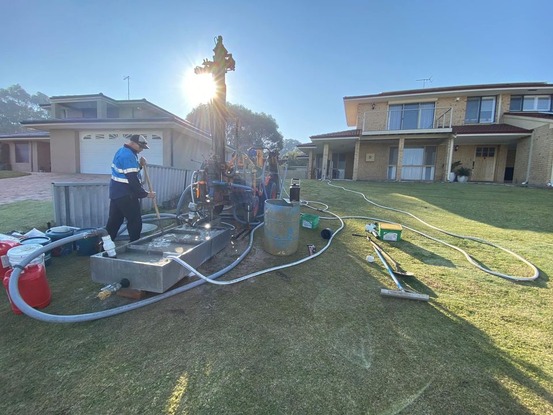Sustainable Water Bore Drilling Practices: Ensuring Reliable Access to Groundwater
Groundwater, a crucial resource hidden beneath our feet, is accessed through water bore drilling, a technique that has become increasingly important for agricultural, industrial, and domestic uses. This blog, tailored by Swell Irrigation, a leader in providing quality irrigation and plumbing services in Australia, delves into the world of water bore drilling, emphasizing sustainable practices vital for long-term water resource management.
Understanding Water Bore Drilling
Water bore drilling is a specialized process used to tap into underground water reserves. It involves drilling a deep hole, or borehole, into the earth’s surface to reach aquifers containing water. This technique is essential for extracting groundwater in areas where surface water is scarce or unreliable.

Reach Us for other Services
The Significance of Sustainable Practices
Sustainable practices in water bore drilling are crucial for preserving water resources. Unsustainable drilling can lead to groundwater depletion, contamination, and environmental degradation. Therefore, incorporating sustainable water extraction techniques and responsible borehole drilling services is imperative for long-term resource management.
Drilling Methods and Their Suitability
Rotary Drilling
Rotary drilling, a common method for water bore drilling, involves a rotating drill bit that crushes and cuts through rock. It’s suitable for various geological conditions, especially hard rock formations. This technique is highly efficient and provides rapid penetration rates.
Cable Tool Drilling
Cable tool drilling, one of the oldest water extraction techniques, uses a heavy string of drilling tools to repeatedly lift and drop a bit into the borehole. It’s effective in unconsolidated and soft rock formations. Despite being slower than rotary drilling, it offers precise control over the drilling process.
Auger Drilling
Auger drilling employs a helical screw to drill into softer ground. It’s ideal for softer soil conditions and shallow water tables. This method is environmentally friendly, causing minimal disturbance to the site.
Matching Drilling Techniques to Geological Conditions
Selecting the right water bore drilling method depends heavily on the geological conditions of the area. For instance, rotary drilling is preferred in hard rock, while cable tool drilling is better suited for softer formations. Understanding the geological makeup ensures efficient water extraction and minimizes environmental impact.
Routine Maintenance and Borehole Longevity
To prolong the life of boreholes, routine maintenance is essential. Regular inspections and cleaning, using appropriate borehole drilling services, prevent clogging and contamination. Well-maintained boreholes ensure consistent water quality and flow.
Rehabilitation of Aging Boreholes
Rehabilitation techniques are crucial for restoring the productivity of aging boreholes. Techniques may include mechanical and chemical cleaning, lining, or even re-drilling. These practices, carried out by professional borehole drilling services, can significantly extend the borehole’s operational life.
Case Studies and Success Stories
Case Study 1: Rotary Drilling in Western Australia
In the arid regions of Western Australia, a groundbreaking project using advanced rotary drilling techniques showcased the effectiveness of sustainable water bore drilling. Faced with hard rock formations and a dire need for water, the project utilized high-tech rotary drills to access deep aquifers. This approach not only provided a reliable water source for local agriculture and communities but also demonstrated the minimal environmental impact of using precise, modern drilling methods. The success of this project has been a beacon, encouraging the adoption of similar sustainable water extraction techniques across the country.
Case Study 2: Auger Drilling in South Australia’s Vineyards
The vineyards of South Australia, known for their world-class wines, faced challenges with water access due to the region’s shallow water tables and softer soil compositions. Here, auger drilling emerged as a sustainable solution. This method, ideal for such geological conditions, allowed for efficient and environmentally friendly water access. The vineyards could maintain their lush growth without over-extracting or causing significant disruption to the soil structure. This case not only highlights the adaptability of water bore drilling techniques but also underscores the importance of choosing the right method for specific environmental conditions.
Case Study 3: Rehabilitation of Boreholes in Queensland
Queensland’s experience with rehabilitating aging boreholes offers valuable insights into sustainable water resource management. Over time, several boreholes in the region had diminished in productivity due to sedimentation and mineral deposits. Through a series of rehabilitation techniques, including mechanical and chemical cleaning, these boreholes were restored to their former efficiency. This not only prolonged the boreholes’ life but also ensured continued access to clean, safe groundwater. This success story is a testament to the potential of maintenance and rehabilitation in sustainable borehole drilling services, emphasizing that proper care can significantly extend the functionality and productivity of water extraction infrastructure.
Sustainable water bore drilling practices are the cornerstone of reliable, environmentally responsible groundwater access. Utilizing suitable drilling methods, routine maintenance, and effective rehabilitation are key to ensuring the longevity and productivity of boreholes. The case studies from across Australia, ranging from advanced rotary drilling in arid regions to the precision of auger drilling in vineyards, illustrate the importance of matching drilling techniques to specific geological conditions for sustainable water extraction.
Furthermore, these practices highlight a larger truth: sustainable groundwater access requires a holistic approach that encompasses not just the technical aspects of drilling, but also a commitment to environmental stewardship and resource management. As we move forward, it’s crucial that companies like Swell Irrigation continue to lead the way in providing quality borehole drilling services, championing innovative and sustainable water extraction techniques. By doing so, we not only meet our current needs but also safeguard this precious resource for future generations, ensuring that water, a vital lifeline, remains abundant and clean for all.
Quality Services is what we do!
Interested in any of our services? Contact us to make an appointment and get started!
Copyright © 2024 Swell Irrigation. All Rights Reserved
